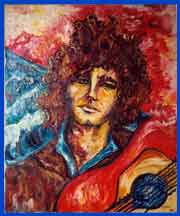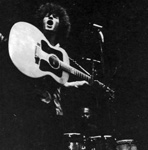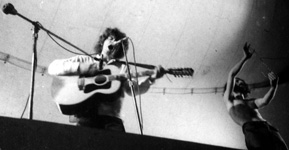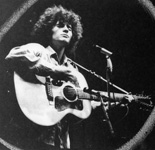

THE ORIGINAL
(AND ALMOST ENTIRELY UNUSED)
LEE UNDERWOOD LINER NOTES
FOR
MORNING GLORY: THE TIM BUCKLEY ANTHOLOGY
(RHINO, RS 76722)
(Written in March 2000)
Tim Buckley
Wandering Minstrel, Starsailor, Honeyman
I. Wandering Minstrel
In 1966, Tim Buckley was a 19-year-old wandering minstrel, a "curly-haired mountain boy" fresh out of Anaheim, California. His bewitchingly seductive Irish tenor voice swooped from whispered intimacy in the low range, up three-and-a-half octaves to serenely high angelic notes that qualified him for every church choir in the nation.
He often sang folks songs in those early days, and his idols were Pete Seeger, Fred Neil and Odetta. But as a songwriter he was never a folkie — he was always his own man, an original. Nevertheless, the press called him a folk singer throughout his nine-year career, probably because he strummed a 12-string guitar and originally recorded for Elektra, a well-known folk label at the time.

The songs he recorded on Tim Buckley (1966), Goodbye and Hello (1967), Dream Letter Live In London (1968), Happy Sad (1968) and Blue Afternoon (1969; released 1970), endeared him to flower-power baby-boomers everywhere, and remain among his best-loved works to this day.
We can nostalgically listen to yesterday's personal favorites and enjoy reliving cherished moments we spent with Buckley's music in our youth. Or, as new listeners, we can pick and choose those songs that appeal to feelings we already know and like. But in addition to appreciating personal favorites, we can also view Buckley as an artist and explorer, as an evolving creator whose exceptionally varied contributions remain musically vital, emotionally relevant and artistically significant more than three decades after he signed his first recording contract in 1966.
Like a pop Picasso, Buckley changed conceptual domains and generic styles five times. He was not a fragmented personality. He was a whole person with an artistically evolving talent that needed to be expressed vocally, compositionally and stylistically in a multiplicity of ways. Like a diamond, he gleamed with many facets — which make the totality of his creative output rich and full for all receptive listeners, equally exciting in personal subjective ways and objective aesthetic ways as well.
Very little of Buckley's work sounds dated. The vast body of his music sounds fresh and in-the-Now. That is perhaps the major reason why so many people who loved him 25 or 30 years ago still love him today, and why so many new young listeners are discovering him for the first time. He was not motivated by money and he did not manufacture formula songs for Top 40 radio. That kind of novelty-oriented business-music occasionally produces hits, but lives only for the moment and quickly dies. Buckley wrote from the realities of his life, which speak to the realities of our own lives, even as we live and grow in time while external fashions change around us. He is receiving all this attention today for one reason: he deserves it. He sang the human heart in all its universal glory.
Tim Buckley includes "Song for Jainie" (her spelling at the time), written in the interim between leaving his wife and establishing his three-year relationship with Jainie Goldstein. "Yes, I'd truly love to be with you/If I wasn't with the one that I'm with." In "It Happens Every Time" and "Aren't You the Girl," Tim touches on one of his most potent themes, the sweet poignance of new love and the aching pain of its loss. In "Wings," he sings of the birth of courage in the face of life's freedom and unpredictability.
Tim and lyricist Larry Beckett were high school buddies, a pair of witty, whimsical, eccentric, intelligent and highly talented creators. Together as one of that era's premier writing teams, they co-wrote a host of songs, including "She Is" and "Song Slowly Song."
"She Is" lyrically celebrates one of Larry's high school loves, while the music to that piece remains one of Tim's more original harmonic progressions. Beckett's "Song Slowly Song" is gem of poetic brevity about tender teenage love, while Tim's musical context for this composition stands as an early atmospheric masterpiece. The harmonic "bell tones" I improvised on guitar became something of a trademark for me.
In 1967, after Tim Buckley, Tim and Larry wrote two quasi-rock songs that did not appear on Goodbye and Hello but were released as a single. Side A was "Once Upon a Time." The B-side, which appears here, was entitled "Lady Give Me Your Key." The single itself has become a collector's item. [Rhino later cut this single from the roster.]
Tim Buckley, a comparatively innocent and ethereal debut album, constituted a first step into the marketplace, but it was the second album, Goodbye and Hello, that put the Buckley/Beckett team on the Billboard map.
Their first work had been an assemblage of separately written songs. For Goodbye and Hello, they composed each song with the whole album in mind. Tim wrote the music for all 10 pieces and penned the lyrics for five. If Beckett tended to be socio-political in cerebrally stimulating literary ways, Buckley tended to write impassioned personal heartsongs of love, death and yearning. Together, Tim and Larry covered all the bases — and the album clicked.
As music, G&H remains impressive in its scope, complexity and intensity. As commercial product, it mirrored the values and musical predilections of the Sixties audience, and thus perfectly reflected the pop culture of its day, which generated sales. Having moved into folk-rock, Buckley the artist was in harmony with business interests, and all went well.
As I wrote in a recently completed book of memoirs entitled Blue Melody: Tim Buckley Remembered, "There was an irresistible poignance in Tim's singing, a delicacy and fragile intimacy in his presentation that cannot be communicated merely by discussing it. He must be heard and experienced to be known. The words touched people, the music touched people, he touched people. Listeners told their friends, who told other friends. As a result, Goodbye and Hello became a steady seller over the years. For many listeners, it became the single work by which Tim was, and still is, identified. Beckett and Buckley weren't the Beatles, but this was their Sgt. Pepper. They weren't Bob Dylan, but this was their Blonde on Blonde."
Beckett dug into his social values on this album, dramatically protesting Vietnam in the very first track, "No Man Can Find the War," wherein he pointed out how guns and flames and other external horrors of war are extensions of the war inside our own minds. CBS taped Tim performing this song at the Cafe Au Go Go in Greenwich Village and featured two brief segments of it in a TV documentary called "Inside Pop — The Rock Revolution," hosted by Leonard Bernstein.
In Goodbye and Hello's title track, Beckett said goodbye to the "antique people," the older generation and its established modes of greed, fear, pragmatism, ambition, corruption, exploitation and violent conflict. He said hello to "the new children," who understood love, courage, joy, nature, cooperation, peace, creativity and higher consciousness. Beckett's political and social protests matched the sociological currents of the day. He fulfilled his literary talent, his temperament and his intelligence on this album, and had every right to feel proud of himself.
In my memoir, Blue Melody, I recall the day Buckley told me to bring my 12-string acoustic Guild to the studio—
We worked on each separate stanza of Larry Beckett's massive "Goodbye and Hello" poem separately. I improvised melodic lines to Tim's 12-string guitar accompaniment until I got the feel of it. We then recorded the stanza. That's the way Tim worked throughout his career — he didn't write notes on paper. He played and sang the music. Other musicians listened, learned, then added their contributions.
After we recorded each separate section, Tim spliced them together into a unified composition and recorded his vocal tracks over it, after which Joshua Rifkin wrote the 14-piece orchestral arrangements (uncredited; and some say producer Jerry Yester wrote the arrangements), occasionally utilizing my melodic lines as springboards.
To this day I stand amazed at the fact that Tim could compose music for this lengthy, complex poem. He had no formal musical education, no knowledge of chords and no knowledge of composition. But he did it. And he did it well.

"Morning Glory" (which we often called "The Hobo") was another sterling Beckett/Buckley collaboration, later covered by Linda Ronstadt, Blood, Sweat and Tears and others (more recently by Chrissie Hynde, on Bleecker Street). Beckett's lyrics tell the tale of a narrator lighting his "purest candle" close to his window, catching the eye of a passing hobo and asking him to tell him stories. The hobo refuses and walks away. Buckley's enchanting melodies to this song are captivating, and the poignant emotional climate of the piece proved irresistible to thousands of listeners. The choir voices in four-part harmony were done by Tim and producer Jerry Yester, both singing each part in unison. "The Hobo" became one of Tim and Larry's most popular songs (although in concert one time, Buckley turned to me after performing it and said, smiling, chuckling, "I've never had the slightest idea what that song is about, do you?")
To my ears, one of the most imaginative pieces on the album is "Hallucinations," a spacious, intimate Beckett/Buckley love song, atmospherically reminiscent of the first album's "Song Slowly Song" (and "Song of the Magician"). In this piece, Tim revealed his growing interest in sonic textures above and beyond conventional words and melodies, showcasing shakers, rattles, African kalimba, and washes of percussive/melodic, surrealistic, dreamlike psycho-sonic instrumental "weirdness" between stanzas. On certain verses he consciously departed from a fixed 4/4 rhythm for the first time, something he later explored in depth with Lorca and Starsailor.
For Goodbye and Hello Buckley wrote both the lyrics and the music to some of his best and most well-loved songs. "Once I Was" (with harmonica played by Henry Diltz, uncredited) spoke of the sad passing of man-woman love, of the fading away of love's "rubbish dreams," and of his own inevitable demise, poignantly asking "Will you ever remember me?" It was used in two films, Changes and Coming Home, and appeared posthumously on Dream Letter and Morning Glory (the Peel Sessions).
A couple of weeks after recording "Goodbye and Hello" with Tim, I walked into the Western Studio 3 where he and conga player Carter Collins, bassist Jim Fielder and drummer Eddie Hoh were playing "I Never Asked to be Your Mountain." Recalling that moment in Blue Melody —
Tim's guitar thundered. The rhythms were fierce, urgent, far more intense than anything I had heard him play before. His voice soared into the air with a new strength, grace and power. Everything about this music was assertive and free, full of pathos, drive, transcendent emotion. There was no other word for it: grand. As I stood in the booth, looking through the glass while they played, adrenaline surged through my veins. Who IS this guy?
Tim's scorching rhythms to "I Never Asked to be Your Mountain" throbbed beneath an impassioned explanation to his abandoned "Flying Pisces" ex-wife Mary. She didn't understand his love; she didn't know why he tried to be the fullest person he could; he never asked for the responsibility of her love in the first place — all sung with a musical brilliance and emotional intensity unparalleled in popular music at that time and, in my view, still unmatched today. ["Mountain," one of Tim's greatest songs and performances, was later stricken from the roster.]
"Pleasant Street" proved to be one of Buckley's very best songs and one of his personal musical favorites, which he performed on stage to the end. He speaks in symbols of the hard, loveless ways today's "stony people" are living, and the way they dress in somber, tradition-oriented, moralistic "Christian licorice clothes" rather than celebratory, spiritually liberated rainbow attire. He can't wait to escape the psychological, moral and materialistic ugliness of mainstream straight life and get back to the comforts of oblivion.
In the third and final phase of his "wandering minstrel" period, Buckley stepped beyond folk and folk-rock. Dream Letter was a transitional album between Tim's earlier stylings and his emergent mellow jazz. It was recorded live in Queen Elizabeth Hall on October 7, 1968, during our second European tour (dates cited in Dream Letter's notes are here corrected). On Dream Letter, "I've Been Out Walkin,'" "Wayfarin' Stranger" and "The Troubadour" hearken back to Buckley's early folk days. "Strange Feelin'," "Buzzin' Fly" and "Sing a Song for You" belong to the new jazz stylings of Happy Sad, recorded shortly after Dream Letter and released in the Spring of 1969.
Evolving from the simple to the complex both internally and externally, Tim always looked for new evolutionary creative directions and new ideas to fuel them. During this period, moving past Pete Seeger, Fred Neil and Odetta, he now listened extensively to Miles Davis, pianist Bill Evans, horn player Roland Kirk, the Modern Jazz Quartet, guitarist Gabor Szabo (one of my significant influences), and many others. By mid-1968, vocal and instrumental improvisation became the mode, the method and the meaning.
Inspired by the sounds of jazz, Tim hired vibraphonist David Friedman and acoustic bassist Johnny "Bongo" Miller, well-schooled musicians with a great love of improvisational music. David remained with Tim for more than a year, recording on Dream Letter, Happy Sad and Blue Afternoon (he also appeared on the posthumous Works in Progress). Along with John Miller's acoustic bass lines, it was perhaps especially Friedman's vibraphone that gave Tim's music its distinctive jazz flavor. It was Friedman who playfully dubbed Tim's group at this time, "The Modern Jazz Quartet of Folk."
One day, Tim walked in and heard Friedman and Miller playing a piece he was already familiar with — Miles Davis' "All Blues" from Kind of Blue. He played along with them, and out of that impromptu session "Strange Feelin'" was born.
One night in New York, Tim and I dropped Owsley acid at a friend's apartment, zipped back to the Albert Hotel (rushing on LSD as the elevator ascended), and spent the night writing "Buzzin' Fly," one of Tim's best-loved Happy Sad songs. He strummed and sang. I played guitar. The walls and curtains breathed. Glistening orange velvet lining in our open guitar cases undulated like red-orange seawaves.
With Happy Sad, Tim left Beckett and his lyrics behind in order to explore, expand and develop his own considerable skills as a solo songwriter. Some felt he might be doing himself a commercial disservice. As it turned out, Goodbye and Hello had peaked at #171 and faded in five weeks, while Happy Sad reached #81, stayed on the charts for three months, and became Buckley's biggest hit. Even as recently as October 4, 1999, in an online Buckley Album Popularity Poll, Goodbye and Hello placed fourth, while Happy Sad placed first. It is still Buckley's number one seller.

In late 1969 Buckley recorded Lorca for Elektra, immediately followed by Blue Afternoon for his new label, Straight. The second side of Lorca and nearly the whole of Blue Afternoon showcased songs written with familiar forms, melodies, harmonies and rhythms that hailed from Tim's earlier folk and mellow jazz periods and appealed to established mainstream fans.
The sensitive, introspective "Driftin'" on Lorca was neatly lifted from a live performance at the Troubadour in Hollywood (posthumously released as Live at the Troubadour). Listening carefully, we can hear the club's background ambience. "I Had a Talk with My Woman" and "Nobody Walkin'" ("Nobody Walkin'" is also from Live at the Troubadour) were both easy-going, romantic songs, eminently accessible.
But the easy-going songs never made it very far in the marketplace, because Tim's vocal originality and the 5/4 odd-time signature on the title track, and the relatively dissonant instrumental contributions on Lorca's entire first side, were simply too far "outside" for orthodox listeners. Tim was taking his first recorded steps into what became known as his Starsailor period — and already getting into trouble.
Knowing Lorca was going to bomb in the marketplace, and needing a commercial album with which to debut his new label, Tim's manager, Herb Cohen, asked Tim to dip into his grab bag of old songs. Tim looked over his shoulder to his prior folk, rock and mellow jazz concepts, plucked some of his best tunes out of the bag, brought vibraphonist David Friedman and bassist John Miller back on board, and recorded Blue Afternoon for his new label, Straight. If it hadn't been for this album, those great songs would never have seen the light of day.
"The River" was among them, as was "I Must Have Been Blind" and "Chase the Blues Away." Throughout the rest of his career, Tim sang his beautiful classic, "Blue Melody" (on which I played piano as well as guitar). Guitarist Steve Khan, son of songwriter Sammy Khan, appeared (uncredited) on two tunes, "Happy Time" and "So Lonely."
Herb strategically released Blue Afternoon before Lorca. Only Don Heckman of the New York Times gave it a good review. Otherwise, ironically, this so-called "commercial" album bombed with critics and listeners alike. Today, however, more than 30 years after Tim recorded it, many listeners regard Blue Afternoon as one of their all-time favorites, right up there with Happy Sad and Dream Letter.